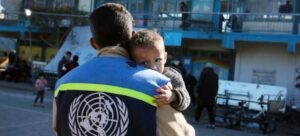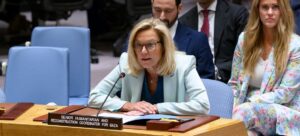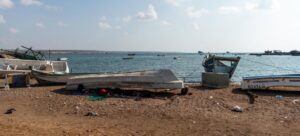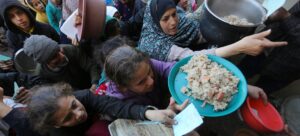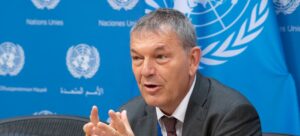“The operationalisation of the mechanism will allow for pipeline prioritisation, predictability, visibility and tracking of supplies to Gaza,” she told ambassadors.
The new plan stemmed from Security Council resolution 2720, adopted in December, which established Ms. Kaag’s position and requested her to forge a UN mechanism to accelerate aid deliveries into the war-torn enclave, which now faces looming famine.
Since Hamas-led attacks in southern Israel in October that left 1,200 people dead and 250 taken hostage, Israeli military operations have killed more than 34,000 Palestinians in the Gaza Strip, as UN and other humanitarian agencies continue to report long delays by Israeli authorities to allow lifesaving aid in at a scale that meets ever growing needs.
“As the resolution intended, the mechanism is designed to facilitate and support the work of all humanitarian partners on the ground,” Ms. Kaag said.
Monitoring in Gaza starts ‘as soon as possible’
The mechanism will initially be applied to the Cyprus and Jordan aid routes, and technical consultations will soon be finalised with Egypt on its route, she said, adding that she has informed Israel about the operationalisation of the mechanism.
“Verification and monitoring inside Gaza will commence as soon as possible,” she explained. “In the coming weeks, my office in Gaza will also be operational.”
In addition, a database and notification system will go online for all cargo destined for Gaza along supply routes, with the approval for placing international monitors at crossings, inspection and supply points having been requested from relevant authorities, she said.
Children climb over the ruins of a property in Deir Al-Balah in the central Gaza.
Paradigm shift needed now
The UN coordinator underlined “the importance of a paradigm shift” to continue to meet the immense needs of the civilian population in a safe and secure manner.
That means a further scale up in the quality and quantity of assistance and distribution alongside irreversible steps to enable safe, secure and unhindered delivery inside Gaza as well as planning and timely preparations for early recovery and reconstruction.
“There is no substitute for political will to sustain these efforts,” she said, emphasising that aid agencies must be able to move food, medicine and other supplies safely and via all possible routes and crossings, into and throughout every part of Gaza.
“Effective humanitarian operations cannot be reduced to counting trucks,” she said. “This is a false metric for gauging whether humanitarian assistance is sufficient, let alone whether it responds to the basic humanitarian requirements.”
In this vein, she said the UN agency for Palestine refugees, UNRWA, is “irreplaceable and indispensable as a humanitarian lifeline and must be allowed to deliver on its mandate”.
Israel’s commitments to ramp up aid deliveries
Israel has taken a number of steps to improve aid delivery since it made commitments on 5 April in response to requests by the UN and the international community, the UN Coordinator said.
That included an increase in the volume of aid cleared, inspected and crossed into Gaza, the temporary opening of the Erez crossing and the opening of the Ashdod port for humanitarian goods as well as repairing the Nahal Oz water supply line.
“Whilst implementation of some measures is ongoing, further definitive and urgent steps are needed to set the course for a sustained flow of humanitarian and commercial goods into Gaza in terms of volume, need and reach,” she said. “Given the scale and scope of destruction and the extent of human suffering every day counts.”
A bakery in Gaza supported by the UN World Food Programme (WFP) reopens after 170 days following a delivery of fuel and flour.
Implementation is urgent
In this regard, she said the UN is in contact with the Israeli Government on other measures that need urgent or continuous implementation, including issues pertaining to checkpoint procedures, road repairs and timely clearances to allow humanitarian convoy movements to take place as scheduled.
“Implementation is urgent,” she said, adding that her office is establishing a monitoring framework to determine the progress and impact of respective measures taken.
Delivering aid at scale requires a functioning humanitarian notification system and improved and direct communications between humanitarians and military decisionmakers on the ground, she said. “Effective and credible deconfliction is vital for all humanitarian actors on the ground.”
Air and maritime corridors
While air and sea aid deliveries can never be a substitute for land transportation, she said the Cyprus maritime corridor provides for additionality of humanitarian aid to Gaza. UN monitors have been deployed to Cyprus as part of the mechanism outlined in resolution 2720.
At the same time, preparations for building a floating port and pier on the shores of Gaza are advancing, with the involvement of the US and other Member States, she said, adding that the UN has outlined the parameters under which it can play a meaningful role in the distribution of aid via this corridor.
She said her office proposed a multi-donor funding mechanism in addition to providing Secretariat support to the maritime corridor to ensure full coordination with the operations on the ground in Gaza, noting that several Member States have indicated their intent to phase out air drops in conjunction with scaling up assistance via land and sea.
Northern Gaza lies in ruins after months of bombardments.
Reconstruction plans
The extent of the destruction and the devastating impact of this war on the entire population call for an ambitious and comprehensive plan of support with commensurate investments, Ms. Kaag said.
The recent UN, European Union and World Bank interim disaster assessment illustrates the scale of the damage and the magnitude of investments required across all sectors, including rebuilding and repairing of the more than 84 per cent of destroyed health facilities.
Echoing the UN Secretary-General’s message, she said the Palestinian Authority has a critical role to play in Gaza, adding that “the international community must work toward enabling its return, strengthen its governance capacity and prepare it to reassume its responsibilities” in the enclave.
Israeli operation in Rafah would compound ongoing catastrophe
Ms. Kaag echoed the UN’s grave concern over the prospect of an Israeli operation in Rafah, where at least 1.2 million people are seeking shelter following evacuation orders months ago.
“Such action would compound an ongoing humanitarian catastrophe, with consequences for people already displaced and enduring severe hardships and suffering,” she said.
In addition, “the UN’s ability to deliver will be constrained,” she added.
“Let us remember that behind every statistic is a human story of loss and suffering,” she concluded. “It isour duty to provide protection, support and therefore hope to the Palestinian population in Gaza. It is also our duty to advocate for lasting peace between Israel and a fully independent, viable and sovereign Palestinian State.”
Ambassador Barbara Woodward of the United Kingdom addresses the UN Security Council.
Scale up implementation: United Kingdom
United Kingdom Ambassador Barbara Woodward said her country joins Ms. Kaag’s important efforts to prevent the situation in Gaza from deteriorating even further.
She welcomed Israel’s commitment to increase aid flows into Gaza, including through the Ashdod port, the Erez checkpoint and by extending the opening hours of the Kerem Shalom crossing.
“We now need to see more implementation. There has been some welcome progress in this regard, but much more needs to be done,” she said.
Deputy Permanent Representative Robert Wood of the United States addresses the UN Security Council.
Protect civilians and aid workers: United States
United States Deputy Permanent Representative Robert Wood noted that the humanitarian situation is more than disastrous in Gaza and that President Joseph Biden has called on Israel to take concrete and measurable steps to protect civilians and ensure the safety of humanitarian personnel.
He said Israel must do more immediately to prevent more casualties, and the positive steps taken so far are insufficient. Israel must take immediate steps to open checkpoints into northern Gaza and immediately implement its commitments regarding the delivery of humanitarian aid through the port of Ashdod.
He said the plan outlined by Ms. Kaag is vital to ensuring aid reaches Gaza on a large scale.
Geng Shuang, Ambassador and Deputy Permanent Representative of China, addresses the UN Security Council.
China: ‘Hunger cannot be used as a weapon’
The Deputy Permanent Representative of China, Geng Shuang, said the worsening humanitarian disaster remains alarming, despite three Council resolutions and the decision of the International Court of Justice (ICJ), which were never implemented due to the numerous restrictions deliberately imposed on aid deliveries. As such, the new mechanism will play an important role in removing obstacles to the arrival of aid.
“Now, it is up to the occupying Power to act to ensure the arrival of aid; hunger cannot be used as a weapon,” he said. Urging all countries to resume funding for UNRWA and refrain from using false pretexts to inflict additional collective sanctions on the Gazan population, he said Israel’s allegations of terrorism against UNRWA are simply baseless.
Brett Jonathan Miller, Deputy Permanent Representative of Israel, addresses the Security Council.
Israel expects to see ‘higher numbers’ of aid deliveries
Israel’s Deputy Permanent Representative, Brett Jonathan Miller, said Israeli authorities are working on opening more aid crossings, and its humanitarian efforts have already brought substantial improvements on the ground, with more than 25,000 trucks entering the enclave since October.
“We expect to see higher numbers in the future,” he said.
Raising other concerns, Mr. Miller said the “UN must find solutions” to logistical issues to keep pace with the speed Israel is clearing aid shipments. He also said the Council must “step up its own efforts” to bring home the 133 hostages held captive since October.
For a full summary of this and other meetings of major UN bodies, visit UN Meetings Coverage in English and French.
